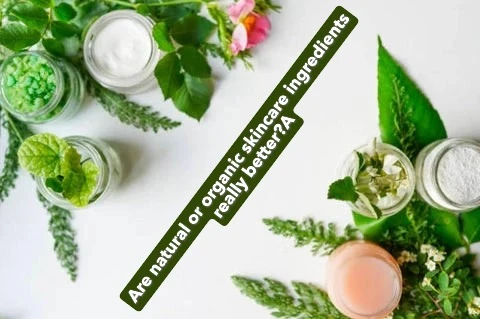Are natural or organic skincare ingredients really better?
Are Natural or Organic Skincare Ingredients Really Better?
The popularity of natural and organic skincare has grown tremendously in recent years, with many people believing that "natural" equals "better" or "safer." While there are certainly benefits to using plant-based and organically sourced ingredients, the truth is more nuanced. Natural or organic ingredients are not automatically superior to synthetic ones, and the effectiveness and safety of any skincare product depend on its formulation, concentration, skin compatibility, and scientific research behind it.
What Do “Natural” and “Organic” Mean in Skincare?
-
Natural ingredients are typically derived from plants, minerals, or other natural sources with minimal processing. Examples include aloe vera, coconut oil, green tea extract, and chamomile.
-
Organic skincare uses ingredients grown without synthetic pesticides, herbicides, or GMOs. Organic certification varies by country, and not all "organic" products meet the same standards.
However, these terms are not always well-regulated. A product labeled “natural” may still contain synthetic preservatives or fragrances, and “organic” doesn’t always mean 100% organic.
Benefits of Natural or Organic Ingredients
-
Rich in Nutrients: Many natural ingredients are packed with antioxidants, vitamins, and essential fatty acids. For example, rosehip oil is rich in vitamin C and essential fatty acids, and green tea has anti-inflammatory and antioxidant properties.
-
Less Harsh (Sometimes): Natural skincare tends to avoid harsh chemicals like sulfates, synthetic fragrances, or parabens that can irritate sensitive skin.
-
Eco-Friendly and Ethical: Natural and organic brands often emphasize sustainability, cruelty-free testing, and environmentally friendly packaging.
Limitations and Misconceptions
-
Not Always Safer: Poison ivy and certain essential oils are natural—but that doesn’t make them safe for skin. Natural ingredients can cause allergic reactions, irritation, or breakouts, especially in raw or undiluted forms.
-
Stability and Efficacy: Synthetic ingredients are often created for stability, consistency, and performance. For example, synthetic vitamin C (ascorbic acid) in a stabilized form can be more effective and less irritating than plant-based alternatives.
-
Lack of Standardization: Natural ingredients can vary in quality and potency depending on the harvest, extraction process, and storage, which can affect product consistency and performance.
-
Shorter Shelf Life: Without synthetic preservatives, some natural and organic products spoil faster or grow bacteria, especially if they contain water and are not properly preserved.
The Best of Both Worlds
Many modern skincare products combine natural and synthetic ingredients to get the best results. For example, a moisturizer might use plant oils for nourishment and lab-created peptides or hyaluronic acid for hydration and anti-aging benefits.
Conclusion
Natural and organic ingredients can be effective and beneficial, but they are not automatically better than synthetic ones. The key to great skincare is not whether an ingredient is natural, but whether it’s well-formulated, backed by research, and suited to your skin’s specific needs. Instead of focusing solely on labels like “natural” or “organic,” look for science-backed products, transparency in ingredient lists, and consistency in performance.

Related Blog
What Causes Oily Skin and Can It Be Managed Naturally? Exploring Root Causes and Gentle Solutions
Aug 2, 2025 by Admin
General
What Are the Signs That You Have Sensitive Skin? Key Symptoms to Help You Identify This Delicate Skin Type
Aug 1, 2025 by Admin
General